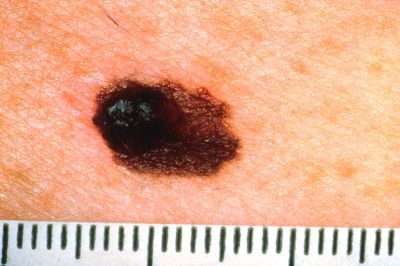Melanoma vaccines

Asymmetrical Melanoma, fot. public domain
Melanoma is caused by mutations in the melanocytes of the skin. Development of a safe, efficacious melanoma vaccine that could also function in a preventative manner remains a significant challenge.
Scientists have long recognised the role of the immune system in fighting cancer. However, since cancer cells originate from normal cells it is difficult for the immune system to recognise them as foreign. To activate the immune system, a series of immunotherapeutic approaches have been tested, including the use of cytokines, cancer-specific patient T lymphocytes and tumour vaccines, all with mixed results.
With respect to cancer vaccines, efficacy has only been met in virus-induced cancer such as in the case of cervical cancer and the anti-HPV vaccine. For cancers of non-viral origin, the design needs to be based on tumour-specific antigens that can elicit strong cytotoxic T cell responses.
The vaccine proposed by the EU-funded 'Prophylactic and therapeutic use of recombinant lymphocytic choriomeningitis virus against melanoma' (LCMVACC) consortium was based on the use of a genetically modified, replication-deficient lymphocytic choriomeningitis virus (rLCMV) to deliver the melanoma antigens. Previous work by the research teams had proved the safety and lack of immunogenicity of this delivery system.
Different melanoma antigens (Melan-A, glycoprotein 100) were delivered in mouse models of melanoma and the immune responses were elucidated. Scientists paid particular attention to the analysis of cytotoxic T cell populations that are vital for overcoming self-tolerance to tumours. The outcome of this work underscores the importance of choosing the appropriate melanoma antigen, and also brings the rLCMV vaccine vector closer to a phase I clinical trial.
With respect to cancer therapy, cancer vaccination and immunotherapy are among the strongest candidates. Although success so far has been variable, the combination of a safe system that can elicit strong T cell responses against a tumour-specific antigen represents a promising strategy. Most importantly, such a vaccine could also work in a prophylactic way in patients at risk of developing melanoma.
published: 2015-04-28